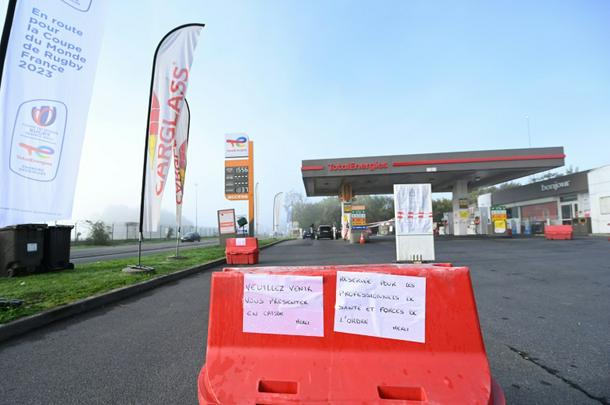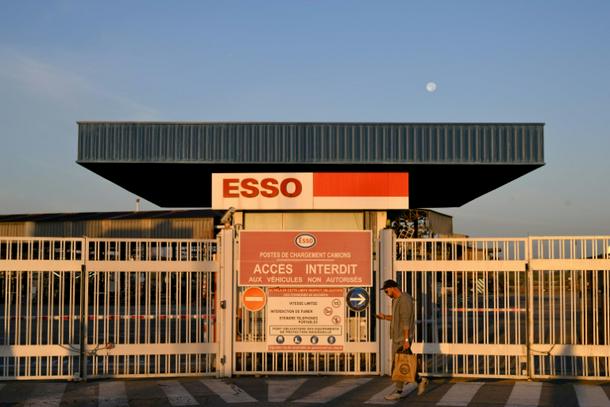
Blockades have paralysed several of France's refineries and oil depots
Paris (AFP) - The French government warned Tuesday striking workers could soon be forced to return to their jobs to break blockades of paralysed oil refineries and fuel depots.
Motorists again besieged petrol stations that are either low on fuel or completely dry as the labour protest at energy giant TotalEnergies and Esso-ExxonMobil entered its third week.
Government ministers have urged a negotiated resolution to the crisis, but have been threatening direct intervention to get supplies flowing again if agreements are not reached soon.
On Tuesday evening TotalEnergies offered to consult unions whose workers were not on strike.
And France’s oil giant renewed an offer to the hard-left CGT union leading the strike to negotiate if its members returned to work.
“If the CGT removes the blockades of the sites before midday (1000 GMT) tomorrow, it will be welcome at this dialogue meeting,” a Total statement said.
Earlier in the day, Prime Minister Elisabeth Borne told parliament workers would be requisitioned in particular at two depots owned by Esso-ExxonMobil, and face fines or jail time if they refuse.
Unions representing overall staff at the company accepted a pay deal Monday, but the CGT and FO unions at the depots rejected it and voted to extend their stoppage.
“Social dialogue means moving forward as soon as a majority agrees,” Borne told lawmakers. “I have asked officials to begin, as allowed by law, requisitions of essential staff for operating this company’s depots.”
Government spokesman Olivier Veran had already warned Tuesday that strikers at TotalEnergies could also be forced back, calling the strike “excessive and out of line”.
The company has said it is willing to advance annual pay negotiations to this month.
But Eric Sellini, CGT coordinator at the oil major, said: “We are still waiting for details from management on what they want to negotiate on.”
His union wants a 10-percent pay hike for all of 2022, pointing to the company’s profit of $5.7 billion in the second quarter of the year, more than double the year-earlier figure.
- ‘They don’t respect us’ -
The stoppages have hit several key refineries, including France’s biggest near Le Havre in the north.

Signs saying petrol sales are reserved for 'law enforcement and health services professionals only' at a TotalEnergies station in Douchy-les-Mines, northern France
The company runs a network of around 3,500 filling stations in France, nearly a third of the total.
At Fos-sur-Mer, in southern France, home to refineries run by TotalEnergies and Esso, strikers said their working conditions had been getting worse for years.
“For the past 10 years we have not been getting the slightest recognition for our work,” said one man who joined Esso 24 years ago.
“Not only don’t they pay us enough, they also don’t respect us,” agreed CGT spokesman Fabien Cros at the neighbouring Total installation.
Franck Tinel, FO secretary for Esso at the site, said the threat of forcing workers back to work would have only a limited impact.
“They’re going to unblock internal depots for these refineries, but we’re not storage sites, so in fact these volumes will be used up quickly,” he said after Borne’s intervention.
Other workers acknowledged that tensions could rise further if the government began ordering refinery workers back.
- ‘We can’t work’ -
Long queues formed outside petrol stations from dawn Tuesday, with many people using social media to exchange tips on the best places to go.
One post in a Facebook group Monday said a local BP service station would be resupplied “at 2:30 pm”. Another replied: “It’s now 2:37 pm and they’re out of diesel.”

Around a third of France's service stations are low on, or out of, petrol as strike action enters its third week
Jefferson Saint-Louis, a taxi driver, said “without fuel we can’t work. I’m just going to go home”.
The crisis comes at a time of high energy prices and inflation that are sapping French households’ purchasing power.
The frustrations could add impetus to a “march against the high cost of living” in Paris and elsewhere on Sunday, called by the left-wing opposition coalition Nupes.
At the weekend, several prominent French people came out in support of the initiative, including this year’s winner of the Nobel Prize for Literature, Annie Ernaux.
“With this government, when dialogue stalls, it’s threats for the wage earners and caresses for the bosses,” tweeted Manuel Bompard, a deputy for the left-wing LFI party.
burs-jh/js/bp/imm